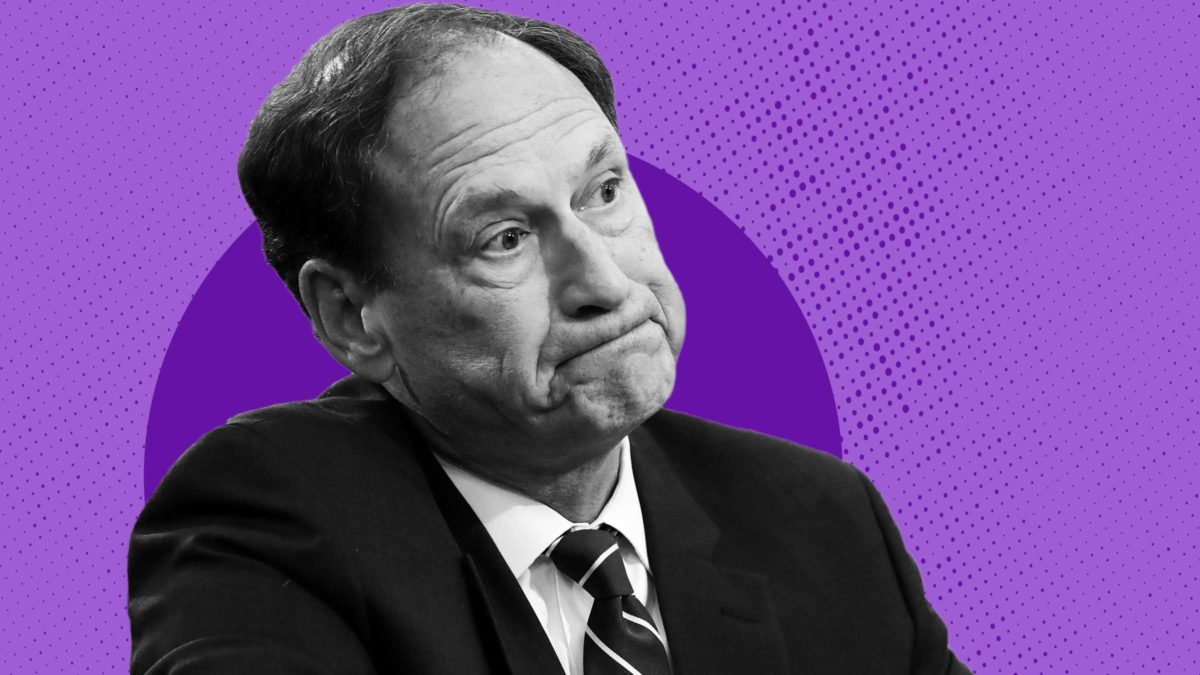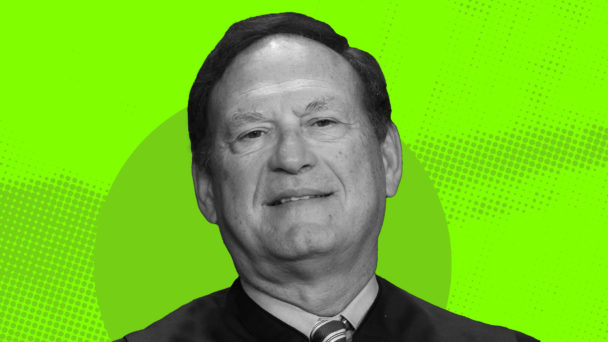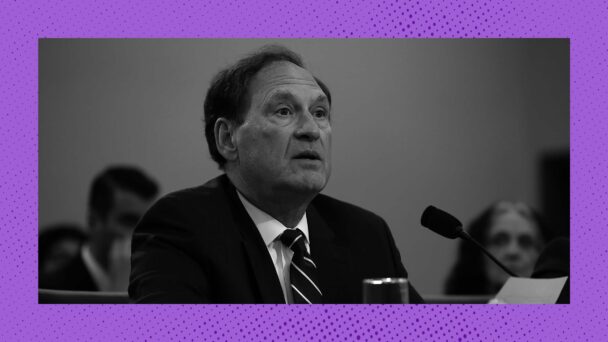On Wednesday, ABC News reported that in a phone call with President-elect Donald Trump the day before, Justice Samuel Alito had recommended a former clerk, William Levi, for a position in the incoming administration. Levi, who served as chief of staff to Attorney General William Barr during Trump’s first term, is reportedly under consideration for “various legal jobs” this time around, including general counsel to the Department of Defense. According to the New York Times, since Barr’s reticence to help overturn the 2020 election results makes him sort of persona non grata in Trump’s inner circle these days, Levi needed someone like Alito to call the boss man and vouch for his loyalty.
At first blush, an off-the-record chat between a sitting justice and a Republican president-elect with a bevy of high-stakes business before the Court might seem, say, “inappropriate.” But don’t worry—Alito reassured ABC News that Levi’s qualifications were the sole topic of conversation. In fact, he specifically insisted that they did not discuss Trump’s request that the justices block a New York state court from sentencing him in his criminal hush money case on Friday. Trump’s apparent eagerness to connect with Alito this week of all weeks—Alito said he agreed to speak with Trump, who initiated the call, at Levi’s request—is merely a coincidence.
Alito also said that he and Trump did not discuss “any other matter that is pending or might in the future come before the Supreme Court”—to name a few imminent examples, the TikTok case in which he has asked the Court to intervene on his behalf, the legal fight over the release of Special Counsel Jack Smith’s various investigations of Trump’s alleged criminality, or the possibility that Trump will get to fill Supreme Court vacancies in the not-so-distant future. On Thursday, the New York Times reported that Trump “initially seemed confused” about why the two were talking, believing that he was returning a call from Alito, but that once Alito clarified the task at hand—again, discussing Levi’s credentials and absolutely nothing else—Trump “then got on track.”
In fact, Alito stressed in his statement, Trump didn’t ask the Court to stop his sentencing until after their call, and that Alito had no idea Trump would even make such a request until the moment the application crossed his desk. This makes perfect sense: Who could have possibly foreseen that Trump would ask the Supreme Court’s conservative supermajority, which consistently ruled in his favor in the run-up to the 2024 election, to shield him from consequences one last time? Especially with a mere 48 hours until his sentencing in a Manhattan courtroom, and ten days before his inauguration as President of the United States?
I, for one, think the conspiratorial outrage over this little episode is misplaced and, frankly, a little alarmist! Have our public servants not earned the benefit of the doubt? Certainly, there would be nothing higher on a president-elect’s list of priorities right now than making final decisions about which generic-looking BigLaw partner gets to serve as in-house counsel to which executive agency. Surely, a famously detail-oriented executive like Donald Trump insists on personally calling the references of anyone he considers for mid-level administration jobs. And of course, there is simply no way for Trump to vet his former staffer, who has not worked for Alito in over a decade, other than requesting an off-the-record conversation with one of nine people who will decide whether he must endure the indignity of a criminal sentencing before taking the oath of office.
Consider, too, Trump’s legendary ability to stay on topic when speaking extemporaneously; his abiding respect for the separation of powers; and his steadfast dedication to avoiding the appearance of impropriety in his professional dealings. What episode(s) in recent history, I ask, would lead you to believe that Trump would veer off-script during a phone call when doing so benefits him? What could make anyone suspect that he might be willing to promise or extract favors in return for loyalty, submission, or some combination thereof?
Let me state it more plainly: Are you really so cynical as to believe that Donald Trump, knowing what his lawyers were about to file with the Court, would try to grease the wheels of justice with a Republican justice in the hours before the paperwork hits the docket?
For that matter, what, pray tell, has Alito ever done to suggest that he feels comfortable engaging in freewheeling conversation with a perceived ideological ally in a one-on-one setting? What evidence is there that he is the sort of person who would possibly consider sharing information about a Supreme Court case that he was not, strictly speaking, at liberty to disclose? Come to think of it, why would you imagine that Alito, perhaps more than any of his colleagues, might be especially predisposed to sympathizing with Trump in the first place?
I would also suggest that those inclined to be skeptical of Alito’s account take a deep breath and remember who we are talking about here, for goodness’s sake. No one, after all, respects the role of the free press in our democracy more than Sam Alito. Indeed, I defy you to name one instance in which he has been anything less than transparent and forthright with investigative journalists asking him questions, particularly when his integrity is at all at issue.
Candidly, I am sort of annoyed that anyone would even think of doubting the moral rectitude of Donald Trump and Sam Alito, dedicated public servants who have not once placed their personal interests above their solemn commitments to uphold their oaths of office. But if you remain unpersuaded that this call was anything less than one hundred percent on the up-and-up—perfect, one might say—rest assured that Dick Durbin is already drafting a polite letter asking Chief Justice John Roberts to investigate the matter immediately, if he feels like it.
This post was updated after publication to include information from the New York Times story.




